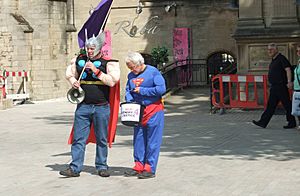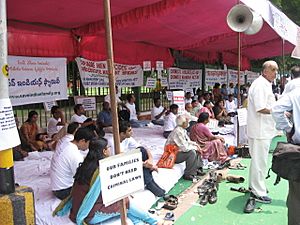Men's rights movement facts for kids
The men's rights movement (MRM) is a part of the larger men's movement. It includes many groups and people, called men's rights activists (MRAs). These groups focus on problems in society and government services that they believe unfairly affect men and boys.
Some common topics they discuss include family law (like who gets to care for children after a divorce, or money paid to a former spouse), having children, domestic violence against men, education, joining the military when required (called conscription), and health rules. The men's rights movement started in the early 1970s. It came from the men's liberation movement.
Many experts say this movement, or parts of it, is a reaction against feminism. Some parts of the movement have been called hateful or even promoting harm against women by experts. In 2018, the Southern Poverty Law Center said some men's rights groups were part of a hate group idea called male supremacy. However, they also said other groups "focused on legitimate grievances" (real problems).
History of the Men's Rights Movement
How the Movement Started
The idea of "men's rights" was talked about as early as 1856. At that time, some people used the term to respond to the growing women's rights movement.
In the 1920s, three groups for men's rights formed in Austria. They wanted to "fight all extremes of women's freedom." These groups did not like women joining the workforce. They also felt that the women's movement was harming social and legal rules. They criticized marriage and family laws, especially rules about paying money to former wives and children. These groups stopped existing before 1939.
Breaking Away from Men's Liberation

The modern men's rights movement grew from the men's liberation movement in the early 1970s. At first, scholars looked at how both men and women were affected by traditional gender roles. They believed that both suffered in a society where men held most of the power.
By the mid-1970s, this movement started to focus more on how men were treated unfairly. In the late 1970s, it split into two different groups. One was the pro-feminist men's movement. The other was the anti-feminist men's rights movement. This second group saw men as being treated unfairly.
In the 1980s, the men's rights movement focused only on how gender roles were unfair to men. They did not focus on how both genders were affected. Some people even said that the U.S. was a "matriarchal society." This meant they thought women had too much power.
A big concern for the men's rights movement has been the rights of fathers. In the 1980s and 1990s, activists often disagreed with changes that feminists wanted. They wanted to keep traditional family roles.
Groups and Organizations
One of the first big men's rights groups was the Coalition of American Divorce Reform Elements, started in 1971. Other groups like the Men's Rights Association and Free Men Inc. also formed in the 1970s. Free Men Inc. later became the National Coalition for Men.
In the United Kingdom, the UK Men's Movement started in the early 1990s. In India, the Save Indian Family Foundation (SIFF) was founded in 2005. By 2010, it said it had over 30,000 members.
Men's rights groups have also formed in some European countries. In the United States, the movement has ties to conservative ideas. They have received support from conservative groups and media.
Some political parties have also focused on men's rights. Examples include the Australian Non-Custodial Parents Party (Equal Parenting) and the Justice for Men and Boys party in the UK.
Online Activities
The men's rights movement has grown stronger and more organized with the rise of the Internet. Activists often meet and talk online. Many websites and forums for men's rights have appeared.
One important site is A Voice for Men (AVFM). It is a main place for discussing and organizing men's rights issues. Other sites include the Fathers Rights Foundation and MGTOW.com (Men Going Their Own Way). There are also many forums on sites like Reddit.
People who support men's rights often use the "red pill and blue pill" idea from the movie The Matrix. Those who believe men are treated unfairly in society are said to have "taken the red pill." While some of these groups might disagree with each other, they often share similar views. They usually support traditional ideas of masculinity and are against feminism.
Views on Feminism
Many experts see the men's rights movement as a reaction against feminism. Men's rights groups often disagree with feminist ideas. They say that feminism has gone too far and has harmed men.
Men's rights activists believe that men are victims of feminism. They also think that public groups now treat men unfairly. They do not agree that men as a group have special advantages. Instead, they believe men are at a disadvantage compared to women. This includes issues that were once seen as feminist concerns.
Topics of Concern for Men's Rights Groups
Men's rights supporters care about many different issues. Some of these issues have led to their own groups, like the fathers' rights movement. This movement focuses on divorce and child custody issues. Many of these concerns come from traditional gender roles.
Adoption Issues
Men's rights activists want to give more rights to fathers who are not married when their child is adopted. Some argue that if a mother does not tell the father about her pregnancy, she takes away the child's chance to know their biological father. They suggest that women should be required to tell the father about the pregnancy.
Anti-Dowry Laws
In India, groups like the Save Indian Family Foundation (SIFF) say that women sometimes misuse laws meant to protect them from dowry death and bride burning. SIFF focuses on how anti-dowry laws are used unfairly against men.
Child Custody Concerns
Family law is a big concern for men's rights groups. They argue that the legal system and family courts treat men unfairly, especially when deciding who gets to care for children after a divorce. They believe men do not have the same rights to see their children or share parenting as their former spouses. They use statistics on custody decisions to show what they see as unfairness against men.
Men's rights advocates want to change family laws. For example, they lobby for laws that make joint custody the usual arrangement. This would mean both parents share care for the children, unless one parent is not able to parent.

Divorce Issues
Men's rights groups in the United States started organizing in the 1960s. They were against changes in divorce and custody laws. Before this time, husbands often had more legal power over wives and children. The men in these early groups said that family and divorce laws were unfair to them and favored their wives.
Men's rights activists have argued that divorce and custody laws violate men's rights to equal protection.
Education for Boys
Men's rights supporters say that the education of boys is in trouble. They believe boys are not doing as well in school and are less motivated than girls. They blame the influence of feminism on education. They think this has led to unfair treatment of boys in schools.
They criticize what they call the "feminization" of education. They say that having mostly female teachers and focusing on girls' needs harms boys. They also believe that schoolwork and tests favor girls.
Men's rights groups want more recognition for masculinity. They also want more male role models and more competitive sports in schools. They have also asked for clearer school rules, more traditional school setups (like separate classrooms for boys and girls), and stricter discipline.
One main idea of these groups is that all boys are the same in their school experiences. This means they might not consider how different boys, based on age, background, or culture, might react differently to school methods.
Female Privilege Views
The men's rights movement does not agree that men have more advantages than women. The movement has two main groups. One group thinks that both men and women are equally harmed by unfair treatment based on gender. The other group believes that society supports treating men badly and supports what they call "female privilege."
Government Structures
Men's rights groups have asked for government groups to deal with issues specific to men and boys. These include education, health, work, and marriage. In India, men's rights groups have asked for a Men's Welfare Ministry. They also want a National Commission for Men, or for the existing National Commission for Women to be removed.
In the United Kingdom, some have suggested creating a Minister for Men, like the existing Minister for Women. This idea was rejected by the government. In the United States, Warren Farrell leads a group that wants a White House Council on Boys and Men. This would be like the White House Council on Women and Girls.
Men's Health
Men's rights groups see health problems faced by men, and their shorter lives compared to women, as proof of unfair treatment. They claim that feminism has made women's health issues more important than men's. They point out that less money is spent on men's health issues compared to women's. For example, they say prostate cancer research gets less money than breast cancer research.
However, women and minority groups were often left out of medical research until the 1990s. Many medical experts warn that false ideas about men representing all people in research are still common. Studies suggest that unfair treatment against females is still common in medicine.
Homelessness Among Men
Glen Poole, an author, says that homelessness is an issue that affects genders differently. He states that in Britain, most homeless people are men. A 2018 study in Pennsylvania found similar numbers of men and women who said they were homeless. However, this study did not cover the entire United States.
Incarceration Rates
Men's rights campaigners believe that men are treated more harshly than women in justice systems around the world. They point to the much higher number of men in prison as proof. In many countries, 90–95% of prison inmates are male. Studies have shown that men are more likely to be put in prison than women for similar crimes. They also get longer sentences and have to serve more of their time.
Military Conscription
Men's rights activists argue that only requiring men to join the military is an example of unfair treatment against men. Historically, most societies have only asked men to join the military. This means men risk their lives and health in wars. About 80 countries still require people to join the military, and most of these only draft men. As of 2018, only two countries, Norway and Sweden, required women to join under the same rules as men.
In the United States, all males aged 18–25 must register for Selective Service. If they do not, they can face fines, prison, and may not get student loans or federal jobs. Women are not required to register. In 1981, the Supreme Court said that only drafting men was allowed. They said Congress could focus on military needs, not just fairness.
In 2016, the decision to open all combat jobs to women restarted the debate about whether women should also have to register for Selective Service. A court in Texas later ruled that the male-only draft was unconstitutional.
Paternity Fraud
Men's and fathers' rights groups are concerned about "paternity fraud." This happens when a man is led to believe he is the biological father of a child, but later finds out he is not. They believe that men should not be forced to support children fathered by another man. They also say that men are harmed because they form a bond with a child who is not theirs. This also prevents the child and their biological father from having that relationship.
Men's rights activists support using DNA tests to check who the father is. They also want mandatory paternity testing for all children. They have strongly supported men who are found not to be the biological father but are still required to pay child support. Some places have passed laws to help men in these situations.
Estimates of how often this happens vary. Some campaigners claim that between 10% and 30% of children are being raised by men who are not the biological father. However, experts say these numbers are much too high. They estimate it is closer to 1% in Australia and the UK, and 3% in the US. Even the lowest estimates show that this affects tens of thousands of men in the US alone.
Reproductive Rights for Men
Men's rights campaigners say that women have many legal ways to choose not to be a mother after getting pregnant. However, a man has no choice in whether he becomes a father. He is dependent on the mother's decision. Also, a man who does not want to be a father can still be forced to support the child financially.
Because of this, some suggest a process that would allow the biological father to choose not to have any rights or responsibilities for the child before the child is born. This would include not having to pay financial support.
Social Security and Insurance
Men's rights groups argue that women get better social security and tax benefits than men. Warren Farrell states that men in the United States pay more into social security. However, women receive more in benefits overall. He also says that unfair treatment against men in insurance and pensions has not been noticed.
Well-Known Men's Rights Activists
Most men's rights activists in the United States are white, middle-class, heterosexual men. Important supporters include Warren Farrell, Herb Goldberg, Richard Doyle, and Asa Baber. There are also women in the movement, such as Helen Smith, Christina Hoff Sommers, Erin Pizzey, and Bettina Arndt.
Karen DeCrow
Karen DeCrow was an American lawyer and activist. She was president of the National Organization for Women from 1974 to 1977. She strongly supported equal rights for men in child custody decisions. She argued for shared custody after divorce. She also believed that men, like women, should be allowed to choose not to become a parent. She was a strong supporter of fathers' rights movements. She also argued that domestic violence is a "two-way street," meaning it can happen from women to men as well.
Marc Angelucci
Marc Angelucci was an American lawyer and men's rights activist. He was the vice-president of the National Coalition for Men (NCFM). As a lawyer, he worked on several cases about men's rights. One important case was National Coalition for Men v. Selective Service System. In this case, a judge said that the male-only military draft was unconstitutional. Another case, Woods v. Horton, ruled that California had unfairly left men out of domestic violence victim protection programs.
Warren Farrell
Warren Farrell is an American educator, activist, and author. He has written seven books about issues affecting men and women.
Farrell first became known in the 1970s as a supporter of second wave feminism. He served on the New York City Board of the National Organization for Women (NOW). He is often called the 'Father of Men's Rights Movement.' Farrell supports a "gender liberation movement." He believes both sexes should try to understand each other's experiences.
Herb Goldberg
Herb Goldberg was an author and psychologist. He wrote books like The Hazards of Being Male: Surviving the Myth of Masculine Privilege (1975). He was a professor of psychology at California State University, Los Angeles.
Erin Pizzey
Erin Pizzey is an English men's rights advocate. She is also a domestic abuse advocate. She has a controversial idea that most domestic violence between men and women is mutual. Pizzey has written two notable books, Scream Quietly or the Neighbours Will Hear and Prone to Violence.
Bettina Arndt
Bettina Arndt is an Australian men's rights activist. She received an award called the Order of Australia in 2020 for her work on gender fairness. Even with strong criticism, the award council decided not to take her award away.
See also
 In Spanish: Movimiento por los derechos de los hombres para niños
In Spanish: Movimiento por los derechos de los hombres para niños
 | Selma Burke |
 | Pauline Powell Burns |
 | Frederick J. Brown |
 | Robert Blackburn |


